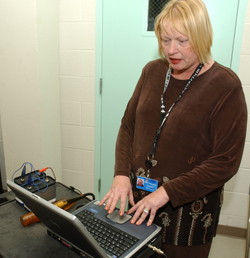University News
Effect of Human-Made Noise on Marine Mammals Topic of 2005 Distinguished Faculty Lecture
March 18, 2005
MACOMB, IL - - Science and civic responsibility in relation to marine mammals and the environment will be the focus of Western Illinois UniversityÂ’s 2005 Distinguished Faculty Lecture by Jeanette Thomas, professor of biology and an internationally-recognized mammalogist and behavioral researcher.
Thomas will present “The Effects of Human-made Noise on Marine Mammals: A Whale of a Problem” at 7 p.m. Thursday, March 31 in the COFAC Recital Hall (Simpkins Hall) on the Macomb campus and at 1:30 p.m. Monday, April 11 in Room 102 on the Quad Cities campus.
“Human-generated noise in the ocean is of growing concern, and governments throughout the world are establishing guidelines for limiting noise exposure to whales, dolphins, seals, manatees, sea otters, diving birds, marine turtles and fish,” Thomas said. “Disturbance by shipping noise has been implicated as a cause for the killer whale population decline, and the local population of killer whales off the coast of the state of Washington has been listed as ‘threatened’ by the U.S. government.”
Ambient noise in the ocean has increased by 10 decibels per decade over the last 30 years, which affects the peacefulness of the ocean environment, Thomas explained. Her lecture will discuss the consequences of exposure to loud noise and the importance of hearing conservation in humans and animals, highlighting studies done by four Western Illinois graduate students on the underwater hearing abilities of dolphins at ChicagoÂ’s historic Shedd Aquarium. She also will discuss how individuals can participate in the reduction of ambient noise.
“Several marine industries produce noise, such as oil and gas exploration and production, shipping, recreational boating, oceanographic research and whale-watching. In addition, some military operations produce very high amplitude noise. For these industries or for the military to abide by noise exposure standards will be a huge challenge and probably will have a large economic impact,” added Thomas.
Thomas, a native of nearby Blandinsville (IL) and a 1973 graduate of Western Illinois with a bachelorÂ’s degree in zoology and botany, returned to her alma mater in 1989 as an associate professor of biology. That year she helped establish a graduate program in marine biology in cooperation with the Shedd Aquarium. In 2001 Thomas developed WesternÂ’s post-baccalaureate program in zoo and aquarium studies to train students for careers with captive animals. Her classes are taught via distance learning and by travel to the Shedd Aquarium and include marine mammalogy, mammalogy, bioacoustics, animal behavior and biological studies in zoos and aquaria.
She earned her masterÂ’s degree (1977) and Ph.D. in ecology and evolutionary biology (1979) from the University of Minnesota and conducted post-doctoral research at Minnesota (1979-80) and at the Hubbs-Sea World Research Institute (1980-85), San Diego, CA, where she was the director of the bioacoustics laboratory. At Hubbs-Sea World Thomas conducted research using a towed array of hydrophones for the U.S. Tuna Foundation, measured the underwater hearing of beluga whales, examined responses of beluga whales to noise from oil platforms and conducted studies on the rehabilitation of sea otters fouled with crude oil. From 1985-89 Thomas was a senior scientist at the Naval Ocean Systems Center in Hawaii, studying echolocation and masked hearing abilities of false killer whales and hearing of the Hawaiian monk seal.
“I came back to Western Illinois in 1989 because I always felt that I wanted to teach,” Thomas said. “Western has given me more opportunities to further my professional career than I could accommodate.”
She has served on numerous departmental, college and University committees, including chair of the WIU-Quad Cities Faculty Council (1999-2002). Thomas has earned Faculty Excellence Awards, was named the College of Arts and Sciences Outstanding Researcher and is an Alumni Achievement Award recipient at Western.
Since 1980 Thomas has received more than $1 million in research grants from organizations including the Office of Naval Research, the National Science Foundation, the North Atlantic Treaty Organization (NATO), National Marine Fisheries Service, the Department of the Interior Minerals Management Service, the Shedd Aquarium and the Hubbs-Sea World Research Institute as well as from WIUÂ’s University Research Council and Foundation.
Thomas has been the editor of Aquatic Mammals, tan international journal of the European Association for Aquatic Mammals, since 1998; is past-president of the Society for Marine Mammalogy; and was a 10-year scientific adviser for the U.S. Marine Mammal Commission. She is the senior editor of four books and the co-editor of one book on sensory abilities of marine mammals. Thomas also has been a presenter and facilitator of professional conferences worldwide.
WIU first presented an annual lecturer award in 1969 to honor an outstanding faculty member whose professional development in research or creative activity, teaching and service to the University represent the highest standards of the academic community. In 1998 the award was renamed the Distinguished Faculty Lecturer.
Posted By: University Communications (U-Communications@wiu.edu)
Office of University Communications & Marketing


Connect with us: